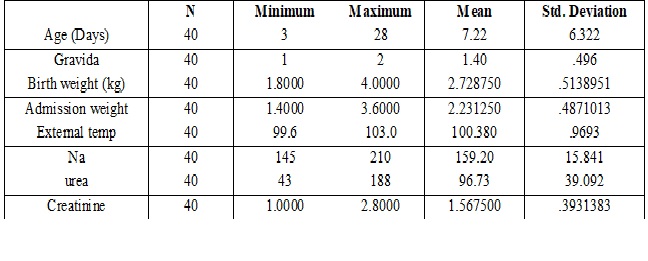Outbreak of hypernatremia, hyperthermia & azotemia during summer months among neonates admitted to tertiary care NICU and their immediate outcome
Abstract
Background: Dehydration and hypernatremia amongst exclusively breast fed neonates due to inadequate breast feeding or due to less feeding is a potentially devastating condition, and its incidence rate increases during hot environment especially during summer months. We conducted this study to identify possible etiology behind dehydration and hypernatremia among healthy newborn.
Methods: Hospital case records of 40 neonates admitted to the NICU in Bapuji Child Health Institute and Research Centre, Davangere during summer months (March –May) 2017 were retrospectively analysed. Case records were reviewed and data collected on parity of the mother, feeding practices,symptoms and signs at presentation, external environment temperature during the week prior to admission, biochemical changes and outcome.
Results: During March-May 2017, there were 620 admissions in NICU. Amongst 620 cases, clinical profile, signs and symptoms, biochemical profile and outcome of 40 cases of hyperthermia were studied. 95% cases had significant weight loss (13-15%), 100% cases had hyperthermia (mean temp 99.3-101 F), 88% cases had hypernatremia (mean Na+ 155-185), 75% cases had azotemia (mean urea 96.73), creatinine(mean1.5). 95% cases were successfully treated according to NICU protocol and discharged within a short period but succumbed.
Conclusion: Dehydration and hypernatremia is preventable and treatable condition. All the mothers need to taught correct feeding method like proper position and attachment of feeding. Signs of dehydration must be explained to mother as well as close relatives. Follow up visits should be ensured and check for weight is must. Not to encourage mother to give any other feed apart from exclusive breast feeding for first 6 months and even during summer months.
Downloads
References
2. Eidelman AI, Schanler RJ. Breastfeeding and the use of human milk. AAP policy statement. Pediatrics 2012;129:e827‑41.[pubmed]
3. Volk AA. Human breastfeeding is not automatic: Why that’s so and what it means for human evolution. J Soc Evol Cult Psychol2009;3:305‑14.
4. Livingstone VH, Willis CE, Abdel-Wareth LO, et al. Neonatal hypernatremic dehydration associated with breast-feeding malnutrition: a retrospectivesurvey. CMAJ. 2000 Mar 7;162(5):647-52.[pubmed]
5. Moritz ML, Manole MD, Bogen DL, Ayus JC. Breastfeeding-associated hypernatremia: are we missing the diagnosis? Pediatrics. 2005 Sep;116(3):e343-7.doi:10.1542/peds.2004-2647
6. Laing IA, Wong CM. Hypernatraemia in the first few days: is the incidence rising? Arch Dis Child Fetal Neonatal Ed. 2002 Nov;87(3):F158-62.[pubmed]
7. Cooper WO, Atherton HD, Kahana M, Kotagal UR. Increased incidence of severe breastfeeding malnutrition and hypernatremia in a metropolitanarea. Pediatrics. 1995 Nov;96(5 Pt 1):957-60.[pubmed]
8. Trotman H, Lord C, Barton M, Antoine M. Hypernatraemic dehydration in Jamaican breastfed neonates: a 12-year review in a baby-friendlyhospital. Ann Trop Paediatr. 2004 Dec;24(4):295-300. doi:10.1179/027249304225019118
9. Lavagno C, Camozzi P, Renzi S, et al. Breastfeeding-Associated Hypernatremia: A Systematic Review of the Literature. J Hum Lact. 2016 Feb;32(1):67-74. doi: 10.1177/0890334415613079. Epub 2015 Nov 3.[pubmed]
10. Iyer NP, Srinivasan R, Evans K, et al. Impact of an early weighing policy on neonatal hypernatraemic dehydration and breast feeding. Arch Dis Child. 2008 Apr;93(4):297-9. Epub 2007 May 2.[pubmed]
11. Konetzny G, Bucher HU, Arlettaz R. Prevention of hypernatraemic dehydration in breastfed newborn infants by daily weighing. Eur J Pediatr. 2009 Jul;168(7):815-8. doi: 10.1007/s00431-008-0841-8. Epub 2008 Sep 26.[pubmed]
12.Konetzny G, Bucher HU, Arlettaz R. Prevention of hypernatraemic dehydration in breastfed newborn infants by daily weighing. Eur J Pediatr. 2009 Jul;168(7):815-8. doi: 10.1007/s00431-008-0841-8. Epub 2008 Sep 26 .[pubmed]
13. Mujawar NS, Jaiswal AN. Hypernatremia in the Neonate: Neonatal Hypernatremia and Hypernatremic Dehydration in Neonates Receiving Exclusive Breastfeeding. Indian J Crit Care Med. 2017 Jan;21(1):30-33. doi: 10.4103/0972-5229.198323.[pubmed]
14. Koo WW, Gupta JM. Breast milk sodium. Arch Dis Child. 1982;57:500-2.[pubmed]
15. Laing IA. Hypernatremic dehydration in newborn infants. Acta Pharmacol Sin.2002;23(Supplement):48-51.
16. Kumar R, Aggarwal AK. Body temperatures of home delivered newborns in north India. Trop Doct. 1998 Jul;28(3):134-6. doi:10.1177/004947559802800304. [pubmed]
17. Boskabadi H, Maamouri G, Ebrahimi M, Ghayour-Mobarhan M, Esmaeily H, Sahebkar A. et al. Neonatal hypernatremia and dehydration in infants receiving inadequate breast feeding. Asia Pac J Clin Nutr. 2010;19(3):301-7.
18. Yaseen H, Salem M, Darwich M. Clinical presentation of hypernatremic dehydration in exclusively breast-fed neonates. Indian J Pediatr. 2004 Dec;71(12):1059-62.[pubmed]
19. Krishnamurthy S, Debnath S, Gupta P. Breast feeding-associated hypernatremic dehydration: A preventable tragedy in newborn infants. J Case Reports. 2011 Mar;1(1):1-5.
20. Bhat SR, Lewis P, David A, Liza SM. Dehydration and hypernatremia in breast-fed term healthy neonates. Indian J Pediatr. 2006 Jan;73(1):39-41.[pubmed]

Copyright (c) 2018 Author (s). Published by Siddharth Health Research and Social Welfare Society

This work is licensed under a Creative Commons Attribution 4.0 International License.


 OAI - Open Archives Initiative
OAI - Open Archives Initiative


